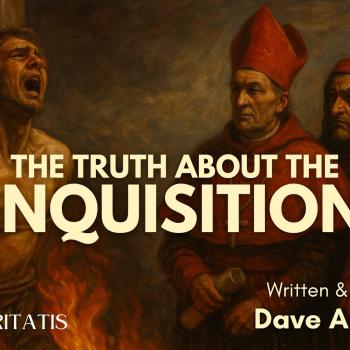
Damon Linker is a well-known writer, who used to be the editor at First Things and has also been an editor at Newsweek and The New Republic. He now writes for The Week. He just announced that he is leaving the Church because of the sex scandals. I understand this on a purely emotional / “passionate” level but not at all by a reasonable analysis.
I recently published an article for National Catholic Register, entitled: “The Sex Scandals Are Not a Reason to Reject Catholicism.” That sums up my thoughts on it. The “sin argument” doesn’t cut it. I would argue that it is when Christian groups start institutionalizing sin and calling evil good (saying, e.g., abortion or same-sex “marriage” or divorce are fine and dandy), that is a legitimate time to leave, because they have departed from apostolic, biblical Christianity.
The United Methodists (I grew up in that denomination) look like they are about to espouse legal abortion. They were one of the last Protestant mainline churches to hold off on doing that. But sinners in the Church is never a good or sufficient reason to depart.
Karl Keating has commented on it, and I largely agree. I wrote over on his Facebook page:
As I always say, “if you have no good reason to be a Catholic (including apologetics knowledge), then you have no reason to stay a Catholic, either.”
Rod Dreher commented on Linker’s departure at great length, yesterday (on the same day Linker announced it). He understands and can seriously relate, because he left for largely the same reasons. I examined his reasons in February and found them severely lacking (to put it mildly). Dreher wrote:
I see in his 2006 book a working-out of personal anguish over the collapse of his personal commitment to Catholicism under the weight of the scandal. As you know, it was happening to me too, at the same time. The difference is that I left, but Damon stayed. He was distant for a time from the institution, but he did not leave it. In light of his column today, announcing his exit from Catholicism, I can better understand the nature of his anguish in 2006, and today. He was (is) a shattered idealist, as I was. We both wanted this Church we had fallen in love with to be better.
Now, you can fault us both for having made an idol of the Catholic Church, and having failed to be realists about human sin. I can’t speak for Damon, but I have written in this space many times about my own responsibility in the personal drama of losing my faith. I did in fact make an idol of the Church, though I didn’t realize it at the time. I thought I was just being a loyal son of the Church. . . .
I can tell you, having practiced it diligently for 13 years, and having been away from it for 12, it does haunt me. I describe having lost the ability to believe in it anymore as like leaving a bad marriage. I wanted so bad for this “marriage” to work, but I realized one day that my bride didn’t love me, that she loved herself, and was going to do whatever she wanted to do, and to hell with me and the kids. Staying in this marriage meant putting up with her abusiveness. I couldn’t do it anymore. I broke. To switch the metaphor, it was like having to hold on to a hot iron skillet with bare hands. Eventually the pain was too great, and I had to let go.
Again, none of this is a reason to leave Catholicism if indeed it is the One True Church and the fullness of apostolic biblical Christianity. For Dreher, beauty and aesthetics in effect trump truth in doctrine and theology. He pretty much flat-out states that himself (it’s not just my speculation):
For Damon, it was Goodness that led him to communion with that Truth. In my case, the aesthetic ugliness of much of contemporary Catholic aesthetics certainly did not break my faith, but it weakened it in the face of the horrific moral ugliness of sexual abuse and episcopal corruption, which broke the bonds permanently. For Damon, the moral ugliness cracked the bonds.
This is something that is hard for intellectuals to appreciate, I find. They are often so given over to appreciation of logic and doctrine that they lack awareness of how severe failures in Beauty and Goodness make it difficult, even impossible, for people to perceive Truth within the Church.
All of which is to say that whatever form that healing and rebuilding takes within Catholicism from the disaster of the last 50 years, it will require not just moral and spiritual regeneration, but aesthetic regeneration too. People will not take you seriously as a proclaimer of Truth if their aesthetic and moral senses tell them otherwise.
At the end of his article, Dreher candidly admits:
For what it’s worth, in my own case, I really did believe the truths. That’s probably why my loss of faith was so excruciating for me.
Well, this is precisely the problem. He believed the [theological] “truths.” Exactly! That is why we are (or why we should be) Catholics. He was willing to forsake these truths (i.e., where his current Orthodoxy differed from them) because of aesthetics and sin in the Church. But those have very little to directly do with the theological truths. I agree that ideally, all should be present together (absolutely), but that is an unreal idealism, given the universality of human sin, and the influence of that same sin on any given institution.
Dreher gives no reason for rejecting the theological truths. Rather, his thinking is that if the aesthetics and perfect holiness are not present alongside those, therefore the theology is suspect. That simply doesn’t follow. Eternal doctrinal or moral truths in the Church from God don’t change simply because someone falls short of following the morality or of understanding and holding the doctrine. They are what they are. The first law of logic is a = a.
To his credit (and to be fair to him), Dreher has written at least one article (in February 2015) detailing sexual abuse in his current communion, Eastern Orthodoxy. I could have told him it was there before he joined up, because it’s everywhere, as I have documented, for example — in 2005 and 2007 — , with regard to Protestant and also Orthodox sexual abuse.
The question then becomes: how ugly and sexually immoral does it have to get within the social group of Orthodox clergy for Rod to leave Orthodoxy, too: if these sins are the “reason” to accept and espouse an entire creed and doctrinal confession? Well, he will have to wrestle with that question. I continue to say that his reasons for leaving Catholicism and joining Orthodoxy made no sense in the first place. They should be based on where the fullness of theological and spiritual truth (in the teaching) exists and can be found.
Damon Linker revealed that he is following the same flawed, woefully insufficient reasoning in leaving the Church as his friend Rod Dreher (who may have personally convinced him to leave, for all we know):
The core of the church’s problem isn’t personal immorality, or institutional corruption, or hypocrisy. The core of the problem is ugliness.
People too often fail to appreciate the role of beauty in religion. We point to revelatory experiences — a supposed eruption of the divine into the realm of the profane or an apparition that communicates a personal message of salvation. Or we highlight a vision of moral righteousness or purity that draws us toward a life of piety.
But there is also the beautiful — in the sense of seemliness, order, and proportion, but also elevation, nobility, and exaltation. My friend Rod Dreher writes movingly about how he was originally drawn toward Christianity by a visit as a young man to Chartres Cathedral in France, one of the most stunning religious structures ever built. Standing before and within this astonishing monument to God, Dreher for the first time felt the presence of the divine in the world and in his life. For him, the building was a powerful testament to the truth of the Christian message. . . .
Of course the history of the church is filled with imperfection, of violence, of all-too-human sin and corruption. But monuments to the church’s message were everywhere to behold: art and architecture, an intellectual tradition, a comprehensive moral and eschatological vision of all things from first to last, a politics founded on a belief in the equal dignity of all. If I didn’t really believe in all of the theological precepts taught by the church, at least I wanted to — because I considered them beautiful, and because I wanted to be a part of the beauty, to elevate myself by assimilating myself to it.
That impulse seems very far away from me now. It began to fade in the church scandals that broke less than two years after I entered the church. . . .
[T]o wade through the toxic sludge of the grand jury report; to follow the story of Theodore McCarrick’s loathsome character and career; to confront the allegations piled up in Viganò’s memo — it is to come face to face with monstrous, grotesque ugliness. It is to see the Catholic Church as a repulsive institution — or at least one permeated by repulsive human beings who reward one another for repulsive acts, all the while deigning to lecture the world about its sin.
No thanks. I’m done.
And I bet I’ll have a lot of company headed for the door.
If Linker is under the illusion that there is some Christian group out there that has no serious sin in its ranks (including his Orthodoxy), he will be sorely disillusioned. I used to think that Quakers had maybe the best record of “no serious scandal” in their history, but recently I learned (watching a documentary on slavery) — and was surprised to hear –, that many of them owned slaves. Wikipedia notes:
Most Quakers owned slaves when they first came to America; to most Quakers “slavery was perfectly acceptable provided that slave owners attended to the spiritual and material needs of those they enslaved”. 70% of Quakers owned slaves in the period from 1681 to 1705; however, from 1688 some Quakers began to speak out against slavery until by 1756 only 10% of Quakers owned slaves.
I have written quite a few critical analyses of atheist deconversion stories (scroll to near the end of my Atheism Web Page).
As one would expect from an apologist like myself, I have yet to find a good reason to leave either Catholicism or larger Christianity. But it’s not true that I can’t find one because I “have” to: as part of my job (as if I am merely special pleading). I genuinely have yet to find a good and sufficient reason in these accounts from former Christians. It was uniformly misguided “reasons” based oftentimes on straw men of even what Christianity taught in the first place.
In many cases of atheists of this type (former Christians), they were fundamentalists, and thus never received an adequate education regarding the best theology and thought in Christianity: even within a solely Protestant framework. They then took this already woefully insufficient knowledge and assumed that that represented Christianity as a whole, and so flailed away at it as atheists (beating straw men): as an anti-intellectual, anti-scientific faith, which is how many atheists view all Christians.
But anyway, if you’re out there tonight, troubled by this current scandal (as you should be, and as I am), whatever is thought about it, it’s not a reason to leave the Catholic Church. If you want to read about why I think that, see these articles of mine, from my web page: “Inquisition, Crusades, & ‘Catholic Scandals'”:
Do Catholic Sexual Scandals Disprove Catholic Truth Claims?
Sins and Sinners in the Catholic Church
*****
I’m here, and will continue to be here, as a defender of the One True Church and for larger Christianity (over against atheism, the heretical cults, and other non-Christian belief-systems). I can provide positive reasons to be a Catholic, and also reasons why the impulse to leave is a bad impulse, and what Satan would love for you to do. Don’t be taken in by his lies!
Fight for reform in the Church (now is the best time ever for laymen to do that), but don’t leave it. That won’t help the Church and it won’t help you. Theological truth and fullness of Christian truth remains what it is, no matter how many fall short of it, and our Lord Jesus predicted all of this, and St. Paul dealt with it in his lifetime (with the Corinthians and Galatians). All of this has happened before in history, to some extent or in some fashion.
***
The following was written in response to the charge on a Catholic page that critics were being too hard on Damon Linker (“start exercising your atrophied empathy muscles and stop shooting our wounded”):
I didn’t deny that he was sincere in his faith. There is no need to do that, and it’s silly and stupid. I assume that he was and have no reason to think otherwise. I simply noted that the reasons were insufficient: that sin is never a reason to leave the Church.
We can have all the compassion and understanding in the world about people leaving because of the scandal (I am outraged and furious about the scandal as anyone, since my job is to defend the Church, and thus I will never be able to escape this mess).
People generally leave the Church because they have an insufficient grasp of apologetics and theology. That’s why I do what I do: I help people to know and understand why they believe what they believe, because if they have no reason to be a Catholic, they will have no reason to stay Catholic. Apologetics is expressly sanctioned in Holy Scripture (e.g., 1 Peter 3:15).
Yes, we have compassion for and a sympathetic ear and heart towards such people. They’re devastated and hurting. I think I am doing so by pointing out that the reasons aren’t good enough, and noting exactly why I think the “sin argument” doesn’t work. It’s an instance of tough love: telling people things they need to hear, that actually will help them — that can solve their personal crisis and problem — , even though they don’t want to hear them at this point in time.
That is seeking to answer the questions and difficulties that people have: explaining why “sinners in the Church” has always been the case, and is no reason to leave, because if it actually was, there could be no Christian Church anywhere, as sin is everywhere.
It’s the Church, after all, that teaches original sin and virtual universality of actual sin, and the struggle with the world, the flesh, and the devil, and our own concupiscence, pride, gluttony, lust, materialism, etc. The unbelieving world doesn’t even believe in those things. It thinks all people are good by nature.
They think we’re all Adam and Eve before the fall. So why does sin: even outrageous, unspeakable sin committed by bishops, ever surprise us? Have the people who are so shocked ever read about Moses, David, Paul, and Peter: all very serious sinners: and three of whom were murderers?
You argue that we shouldn’t kick a person when he is down, etc. Well, yes, of course. If Linker were here with me right now pouring his heart out, I’d give him all my time and would hear him out: all night long if necessary. I’m a compassionate person. I don’t think I’d do what I do for a living (including the poverty and constant attacks that are part and parcel of it) if I weren’t such a person.
But it’s more complex than that. Linker chose to write about it publicly. In doing so, he has chosen to run down the Catholic Church and provide a rationale (however inadequate and flimsy) for rejecting the One True Church and leaving her. That will in turn itself cause others to leave.
Given that act of “public testimony” we are perfectly entitled to defend Holy Mother Church against this bum rap. If she can be torn down in public, then we the faithful are entitled to defend her. It’s not about him; it’s about Holy Mother Church (the real Church; established by Jesus Christ, that is indefectible) and the reasons why anyone should be a Catholic and stay one.
If he didn’t want to undergo the public scrutiny then he didn’t have to publicly write about his personal faith and religion. No one was forcing him to do so. No one had to know anything about it. He could have made his blasts and left his own personal crisis (and negative decision) out of it.
I go through the same thing when I critique atheist deconversion stories. They get fighting mad and act as if this is the worst possible thing any human being could ever do: dare to critique the reasons why atheists reject Christianity.
They chose to make it a public thing and an anti-Christian thing. I didn’t bring that up. I am merely responding as a defender of Christianity. Do they think there is only one possible side? That no one else could possibly disagree? When they lie about and distort our beliefs in public, we must show how they are wrong. The Church fathers did this from the beginning.
I agree that the ones committing these terrible sins bear significant responsibility for people leaving the Church. Jesus said, “woe unto you if you cause any of these little ones to stumble.” They will stand accountable for having soiled their witness to Christ and His Church.
On the other hand, every individual stands accountable for his own choices, and will stand alone before God at the Judgment. As the old blues song says,”you got ta walk that lonesome valley by yerself.” Any person who decides to leave the Catholic Church makes their own final decision.
If the reasons are inadequate, then that is ultimately on them: not anyone who may have played a role as a precipitating cause, because they were lousy Catholics. Those people may well be judged for that, too, but God won’t accept any excuses of that sort when we have to give an account of ourselves.
A priest wrote: “The “rad-trad” tendency to write this person off . . . smells suspiciously like the Donatism and Montanism of the early Church,”
I would say that if there are any Donatist tendencies here, they are on the part of Linker and Dreher (who left for very similar reasons), because they are saying that we can ditch the Church due to sin (and even “ugliness”) in it. That was the rigorism of that schism that was fought against by St. Augustine and others. Then we developed our doctrine of ex opere operato to highlight the fact that the priest can consecrate no matter how personally sinful he may be.
The critics (whether reactionary or not) ain’t the ones saying that Catholics have to be or are perfect. Linker and Dreher are the ones implying that (by straightforward logical deduction) because it is the reason they left: “Catholics and the Catholic Church stink and are ‘ugly’; therefore we’re outta here.”
Then Dreher goes on to imply that the Orthodox Church is so much better. They have the beauty and love where we supposedly lack it (as a general description). It’s not apparently based on any doctrinal considerations at all. It’s based on the presence of sin. But if that is the rationale, like I pointed out, the one who left is bound to be disappointed. Dreher himself was honest and fair enough to have written about sexual scandal in his Orthodoxy too.
I agree with the saying, “if someone says they won’t join a church because it’s full of hypocrites, tell ’em there is always room for one more.” Mark Twain made a similar brilliant observation: “I would never join a church that would have me as a member.”
***
Photo credit: Mstyslav Chernov (3-17-09). Church of the Virgin of the Burgh ruins in the northern part of the Old Town (World Heritage City, UNESCO). Rhodes, the island of Rhodes, the Dodecanese, Greece. [Wikimedia Commons / Creative Commons Attribution-Share Alike 3.0 Unported license]
***













